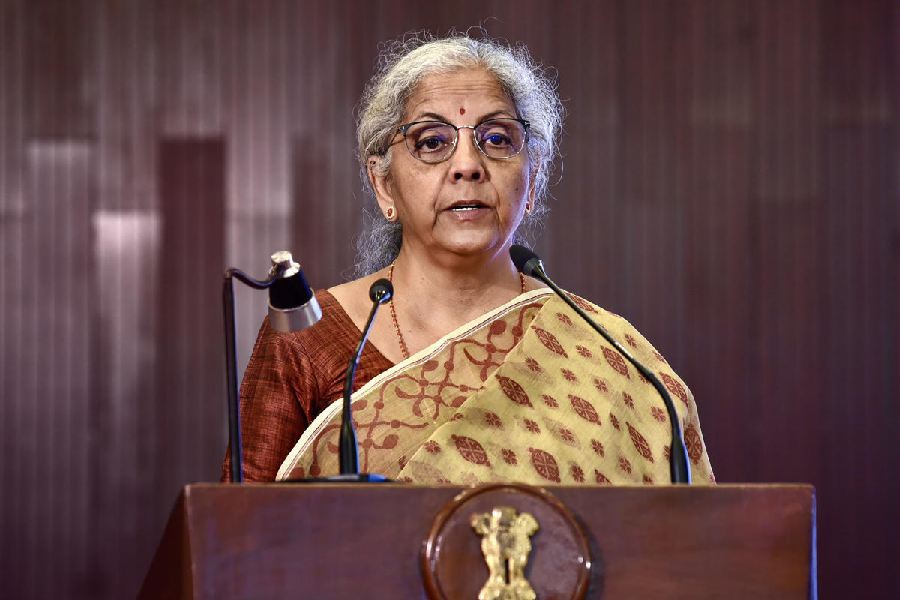With Interim Budget 2024-25 on February 1 just days away, an air of expectation hangs heavy over India's middle class.
This crucial segment of the population, often labelled the engine of economic growth, is yearning for relief on the tax front that could alleviate the pressure of rising costs and stagnant salaries.
In an election year, the government holds the key, and all eyes are glued to finance minister Nirmala Sitharaman as she prepares to navigate the delicate calculus of fiscal prudence and electoral appeal.
While significant changes to income tax slabs may be a distant dream, whispers of a potential hike in standard deduction are generating excitement.
This flat deduction of Rs 50,000, untouched for five years, feels woefully inadequate in the face of ever climbing inflation and shrinking disposable incomes.
A hike in the standard deduction would offer tax relief to individuals in the middle- and lower-income brackets who may not have access to different tax-saving investments and deductions.
Standard deduction is the flat deduction of Rs 50,000 from income that is taxable under the head, salaries.
“It has been almost five years since the standard deduction was revised. To bring parity with the businessmen and professionals, it is expected that the salaried individuals be provided a standard deduction for their official expenses of an amount of at least Rs 1,00,000 in 2024," said Rahul Charkha, partner at Economic Laws Practice.
Deepashree Shetty, partner, Tax & Regulatory Services, BDO India, said: "Since 2019, the average inflation rate in India has increased from 3.73 per cent to 5.51 per cent. An increase in standard deduction of at least 30 per cent — i.e., up to Rs 65,000 — will be appropriate."
The voices of middle-class individuals resonate with Samir Bahl of Anand Rathi Advisors. He paints a picture of financial strain, the steady rise in the cost of living squeezing every ounce of hard-earned income.
In his view, a robust increase in the standard deduction is not just an economic decision, but a moral imperative, an act of solidarity with those struggling to make ends meet.
But the government's hands are not entirely tied. The year has witnessed robust growth in direct tax collections, exceeding budgeted targets. Madan Sabnavis, chief economist at Bank of Baroda, believes this healthy revenue stream gives the government room to manoeuvre.
In the fiscal year 2024, the government's tax revenue collections have been buoyed by robust growth in direct tax collections.
According to data from the Comptroller and Auditor General (CAG) for the April-November period, direct tax collections have surged at an impressive rate of 24.8 per cent year-on-year (YoY), significantly outpacing the full-year budgeted growth of 10.5 per cent.
Economists expect the government to exceed its budget estimates of Rs 9.23 lakh crore for corporate tax and Rs 9.01 lakh crore for personal income tax.
A break-up of gross taxes confirms that for the third consecutive year in 2023-24, direct taxes grew much faster than indirect taxes. "Following a growth of 17.7 per cent in 2022-23, we expect direct taxes (corporate and personal income taxes) to increase 20.5 per cent in 2023-24. At the same time, indirect taxes could grow only 6.8 per cent in 2023-24, compared with 7.3 per cent in 2022-23," Motilal Oswal said in a report.
"We expect this difference in growth to continue in 2024-25 as well, although direct tax growth could moderate to 13 per cent, while indirect taxes are expected to pick up to 11 per cent next year."
Balancing fiscal responsibility with voter appeasement is a delicate dance. The government must ensure any tax relief measures don't derail its deficit reduction goals. However, ignoring the middle class's plight can be equally perilous, potentially dampening consumer sentiment and economic growth.











